Migrating waterfowl from Asia, Africa, and Europe intersect in Georgia, which increases the potential for novel avian-origin influenzas to emerge. I-TECH, through the INSIGHT project, is working with the Centers for Disease Control and Prevention Georgia, the Georgia National Food Agency, and the Georgia Ministry of Environmental Protection and Agriculture, through September 2024 to assess biosecurity and influenza outbreak readiness on commercial poultry farms in Georgia, and support capacity building for and development of a national wild bird surveillance strategy. Activities include a farm biosecurity survey and peri-domestic wild bird capture, sampling, and testing, as well as training in genomic surveillance and design of surveillance programs.
Category: PIs
I-TECH Initiates IDASH in South America with Representatives from 5 Countries
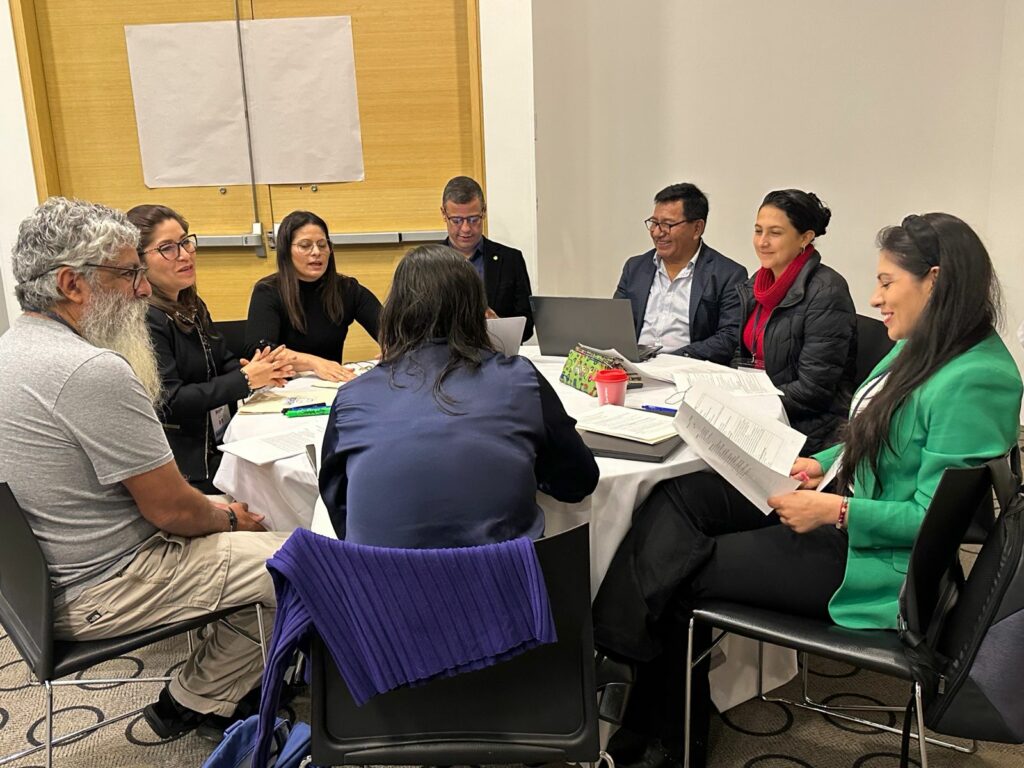
Para mais informações sobre o encontro, em português, acesse Fundação de Vigilância em Saúde do Amazonas – Dra. Rosemary Costa Pinto.
At a February 5-8 meeting in Bogotá, the International Training and Education Center for Health (I-TECH) convened with global health leaders from 5 countries to inform the adaptation of the Informatics and Data Science for Health (IDASH) training program to South American contexts.
IDASH–part of I-TECH’s Integrated Next-generation Surveillance in Global Health: Translation to Action (INSIGHT) project–is a training program for current and future leaders in public health that aims to strengthen regional capacity to use public health information and data systems to improve health outcomes at the population level, detect and respond effectively to threats to public health, and promote health equity.
The objectives of the intensive, weeklong Executive Committee meeting included identifying priorities and key capabilities; adapting the structure of the IDASH course to local needs as well as government priorities and initiatives; and identifying government and academic resources to support teaching.
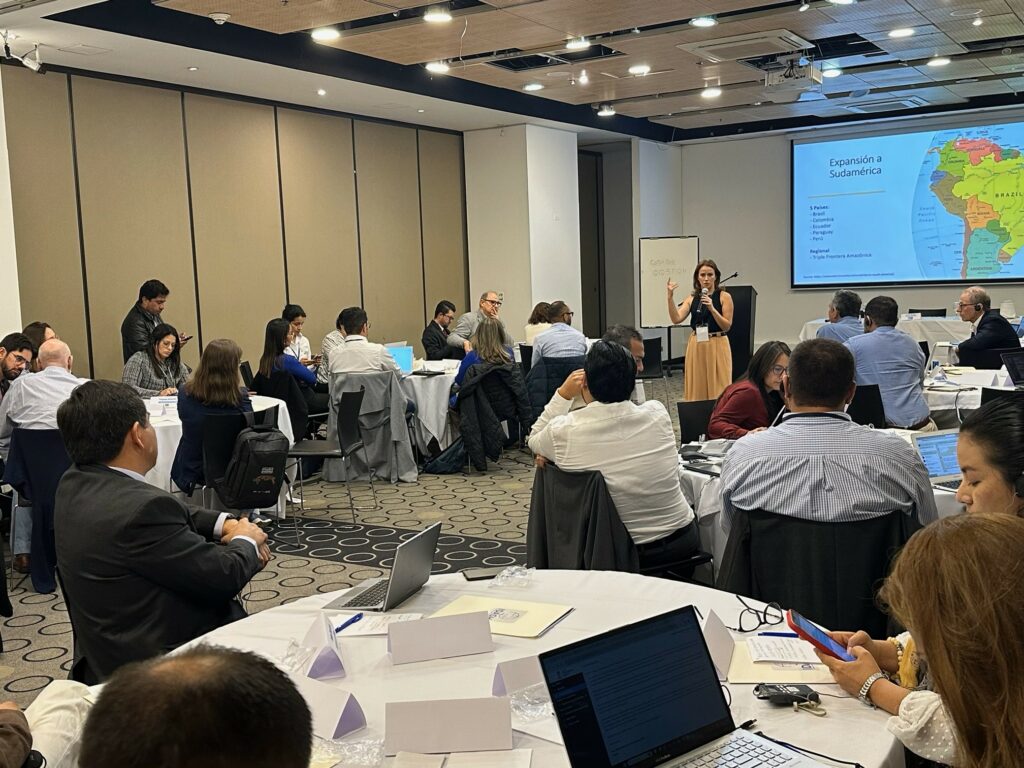
In a a website post of IDASH partner Fundação de Vigilância em Saúde do Amazonas – Dra. Rosemary Costa Pinto, INSIGHT Regional Director for South America Fernanda Freistadt said: “This initiative has the potential to create health professionals who have advanced knowledge in both epidemiology and information technology, an area in which there is a great lack today. Furthermore, IDASH can strengthen technical relations and collaborations in the area of surveillance between countries.”
The Executive Committee Meeting included representatives from Colombia, Brazil, Paraguay, Peru, and Ecuador, as well as international partners including Georgia’s National Center for Disease Control and Public Health (which has been an important partner in the IDASH training program for Eastern Europe/Central Asia). It is anticipated that the South America expansion implementation to happen later this year.
I-TECH Network Presents at End-of-Year Conferences
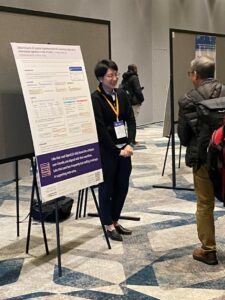
It was a busy fall season for teams throughout the I-TECH Network, several of which had robust representation at end-of-year conferences including the International Conference on AIDS and STIs in Africa (ICASA) 2023 the Global Digital Health Forum (GDHF) 2023.
Welcome additions to I-TECH’s regular lineup of conferences were Infectious Disease Week (ID Week) 2023 and the 40th Annual Oregon Rural Health Conference, attended by representatives of I-TECH’s new network partner, the UW Center for Stewardship in Medicine (CSiM).
Representatives from the network presented more than a dozen posters, spoke at panels and discussions, and led an interactive workshop. Read below for more details (links to presentations will be posted as they are made available).
ICASA 2023, 4-9 December, Harare, Zimbabwe
The theme of this year’s conference was “AIDS is not over: Address inequalities, accelerate inclusion and innovation.” I-TECH Network partner the Zimbabwe Technical Assistance, Training, and Education Center for Health (Zim-TTECH) and its partners Pangaea Zimbabwe AIDS Trust (PZAT) and Zvandiri presented several posters representing their work to innovate and improve access at the training and community levels.
Zim-TTECH:
-
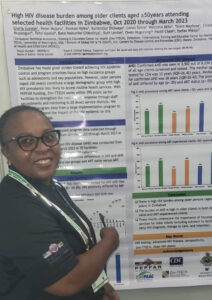
Gloria Gonese at ICASA 2023 Romana R Katekwe, Edson Chidovi, Frances Petracca, Batsirai Makunike, Gloria Gonese, Kerry Thomson, Zwashe Bangani, Haddi Cham, Mirriam Mugwise, Emmanuel Govha, Stefan Wiktor, “Improving Access to Quality Improvement Training through Off-line Electronic Learning: A Case Study from Zimbabwe”
- Langalokusa Sibanda, Peace Ntini, Richard Mashapa, Gloria Gonese, Rickie Malaba, Tendayi Mharadze, Ralph Makuyana, Methembe Ndlovu, Ruth Levine, Vivian Bertman, Abigail K. Korn, Kerry A. Thomson, Owen Mugurungi, Tsitsi Apollo, Getrude Ncube, Mirriam Mutseta, Beauty Nyamwanza, Batsirai Makunike-Chikwinya, Stefan Wiktor, “DREAMS Ambassadors Increase HIV Self-Testing Uptake by Male Partners of Young Women in Zimbabwe”
- Anjali Vasavada, Phibion Manyanga, Sandra Murwira, Lucia Gondongwe, Ponesai Nyika, Batsirai Makunike-Chikwinya, Gloria Gonese, Stefan Wiktor, George Mamire, Kerry A. Thomson, “Acceptance of Free Cervical Cancer Screening Among Zimbabwean WLHIV: Implications for Integration of HPV Testing into Routine HIV Care”
- Rumbidzai Dhliwayo, Lennox Dziva, Ponesai Nyika, Chiedza Mupanguri, Gloria Gonese, Tsitsi Apollo, Owen Mugurungi, Talent Maphosa, Haddi Jatou Cham, Batsirai Makunike-Chikwinya, Stefan Wiktor, “Assessing Implementation and Outcomes of Screening for Advanced HIV Disease (AHD) Among Persons Living with HIV in Five Provinces of Zimbabwe”
- Gloria Gonese, “High HIV disease burden among older clients aged ≥50years attending selected health facilities in Zimbabwe, Oct 2020 through March 2023”
PZAT:
- Precious Moyo, Joseph Murungu, Shamiso Nyakuwa, Casper Hera, Imelda Mahaka, Blessing Mushangwe, Phibion Manyanga, Gloria Gonese, Batsirai Makunike, Takunda Sola, Getrude Ncube, Tendayi Mharadze, Rickie Malaba, Stefan Wiktor, “Key Populations Outreach Activities for Scaling Up HIV Prevention Care and Treatment Services in Harare, Zimbabwe”
- Precious Moyo, Joseph Murungu, Shamiso Nyakuwa, Casper Hera, Imelda Mahaka, Blessing Mushangwe, Phibion Manyanga, Gloria Gonese, Batsirai Makunike, Takunda Sola, Getrude Ncube, Tendayi Mharadze, Rickie Malaba, Stefan Wiktor, “Layering Enhanced Economic Strengthening Interventions to Reduce Vulnerabilities Among Sexually Exploited Minors and Young Women Selling Sex in Zimbabwe”
- Sitshengisiwe Ruzibe, Casper Hera, Precious Moyo, Joseph Murungu, Shamiso Nyakuwa, Imelda Mahaka, Langalokusa Sibanda, Peace Ntini, Gloria Gonese, Batsirai Makunike, Mirriam Mutseta, Getrude Ncube, Tendayi Mharadze, Rickie Malaba, Kerry A. Thomson, Stefan Wiktor, “Services for Sexually Exploited Minors and Young Women Selling Sex Enrolled in DREAMS program, Matabeleland North, Zimbabwe”
Zvandiri:
- Vivian Chitiyo, Tanyaradzwa Napei, Billiart Tapesana, Ann Selberg, Edson Chidovi, Gloria Gonese, Kerry Thomson, Talent Maphosa, Haddi Cham, Ngwarai Sithole, Tsitsi Mutasa-Apollo, Nicola Willis, Stefan Wiktor, “Minimizing Interruption in Treatment (IIT) through Peer Connections of Adolescents and Young People Living with HIV in Zimbabwe”
GDHF 2023, 4-6 December, Washington, D.C.
The Digital Initiatives Group at I-TECH (DIGI), and others from I-TECH, presented their work in a number of ways at this year’s Global Digital Health Forum. GDHF is a leading global public health industry conference for technology vendors, donors, researchers, government representatives, and implementing organizations working in low- and middle-income countries.
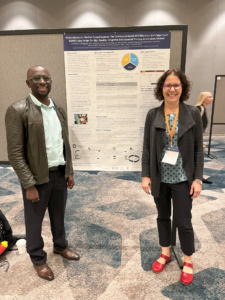
Posters:
- Feldacker C, Murethi M, Ndhlovu D, Bisani P, Kathumba D, Samala B, Oni F, Wagaba K, Kagereki E, Wassuna B, Tweya H, “Mobile Electronic Medical Record Systems: The Community-based ART Retention and Suppression (CARES) App Design for High-Quality, Integrated Antiretroviral Therapy in Lilongwe, Malawi”
- He Y, AbuShweimeh R, Kouabenan YR, Assoa PH, Puttkammer N, Gloyd S, Wagenaar BH, Komena P, Kamelan N, Iiams-Hauser C, Pongathie A, Kouakou A, Hoffman N, Flowers J, Abiola N, Perrone LA, “Determinants of Routine Implementation for Electronic Laboratory Information Systems in Côte d’Ivoire: a Mixed-Methods Implementation Science Study”
- He Y, Kouabenan YR, Assoa PH, Puttkammer N, Gloyd S, Hoffman N, Wagenaar BH, Komena P, Kamelan N, Iiams-Hauser C, Pongathie A, Kouakou A, Flowers J, Abiola N, Perrone LA, “Perceptions and Experiences of Data-Driven Decision-Making and Data Dashboard for HIV Viral Load Testing and Early Infant Diagnosis in Côte d’Ivoire”
- Gadabu O, Manyiyo B, Yiga H, Chigoriwa C, Chirowodza L, White C, Mankowski P, Mutesasira M, Gita C, Maxwell L, Muserere C, Flowers J, “A FHIR Training Workshop to Facilitate Interoperability Between the IMPILO EHR and the LIMS System in Zimbabwe”
- Secor, A, presented by Patric Prado, “Electronic Medical Record Data Missingness and Interruption in Antiretroviral Therapy among Adults and Children Living with HIV in Haiti: A Retrospective Longitudinal Study”
Virtual Panel:
- “Building Next-Gen Digital Health Solutions On FHIR With Open Health Stack” Presenter: Patric Prado
Individual Presentations:
- “Efficiently Leveraging Individual-level Health Data For Population-level Data For Decision Making: A Call To Action For FHIR-based Secondary Data Use” Presenter: Piotr Mankowski
- “Implementation of An Online Course By MOH For Health Workers In Kenya: Strategies And Lessons For Success” Presenter: Robert Oboko
- “Applying Critical Reflection To Reimagine Global Digital Health Interventions: Introducing The (Re)imaginator” Presenter: Beth Dunbar
- “Advancing National Health Information Systems Maturity: Lessons Learnt On Implementing The Informatics-Savvy Health Organization (ISHO) Assessment And Action Planning Framework For Health Leaders In Zambia” Presenter: Kendi Mburu
- “Online Learning as an Innovation And Sustainability Initiative In Digital Health In Low And Middle Income Countries” Presenter: Robert Oboko
Topic Lounge Discussions:
- “Perceptions On The Quality Of Electronic Medical Records In LMIC” Presenter: Jan Flowers
- “Bringing Into Production A Health Information Exchange Architecture In Côte D’Ivoire: Using Open Standards And Software To Enable Cross-site Patient Histories And Real Time Dashboarding. Côte D’Ivoire HIE” Presenter: Casey Iiams-hauser
Interactive Workshop:
- “Creating, Leading, And Managing Informatics-Savvy Health Organizations (ISHO): Concept, Principles, And Application”
ID Week 2023, 11-15 October, Boston, Massachusetts
IDWeek is the joint annual meeting of the Infectious Diseases Society of America (IDSA), Society for Healthcare Epidemiology of America (SHEA), the HIV Medicine Association (HIVMA), the Pediatric Infectious Diseases Society (PIDS), and the Society of Infectious Diseases Pharmacists (SIDP). This year, CSiM presented:
- “Asymptomatic Bacteriuria Underestimates True Inappropriate Prescribing for Non-Urinary Tract Infections” Presenting author: Whitney Hartlage, PharmD
40th Annual Oregon Rural Health Conference, 11-13 October, Sunriver, Oregon
For this year’s Annual Oregon Rural Health Conference, Rupali Jain, PharmD, and Natalia Martinez-Paz, CSiM Manager, shared lessons learned in Cohort 2 of their Intensive Quality Improvement Cohort (IQIC) program and how Critical Access Hospitals can approach QI in the post-COVID-19 healthcare environment.
- Session title: “Case Study: Asymptomatic Bacteriuria Quality Improvement Projects in Critical Access Hospitals”
COVID-19 Sentinel Surveillance in Malawi
Despite establishing COVID-19 monitoring measures within the existing routine national surveillance system and significant efforts to conduct testing, contact tracing, and case investigations, Government of Malawi institutions at both the national and district levels faced many challenges in mounting an effective response to the COVID-19 pandemic. The existing COVID-19 surveillance system relied on retrospective data and it struggled to establish the magnitude of community transmission or identify emerging variants.
In June 2022, in collaboration with the Public Health Institute of Malawi and support from the US Centers for Disease Control and Prevention, I-TECH began sentinel surveillance monitoring of COVID-19 in seven sites. The COVID-19 sentinel surveillance system in Malawi was able to quickly detect changes in positivity rates and the emergence of variants. Read more about key findings and methods in I-TECH’s Sentinel Surveillance program brief.
Digitizing HIV Case Management to Support Patient-Centered Care in Jamaica
In collaboration with the Caribbean Training and Education Center for Health (C-TECH), Jamaica Ministry of Health and Wellness, JASL, and technical working group members, the Digital Initiatives Group at I-TECH (DIGI) is supporting the development and implementation of a mobile health client engagement tool in Jamaica.
The tool facilitates communication between clients living with HIV and their healthcare providers in between their care visits, through a digital case management system and two-way text messaging services. The tool gives clients anytime access to a text-message-based health library and the ability to ping their care team for telemedicine services. This digital health intervention seeks to strengthen the therapeutic alliance and enhance patient medication adherence.
This digital health intervention is made possible through funding and support from the U.S. Department of Health and Human Services’ Health Resources and Services Administration (HRSA) via a sub-award granted to the Caribbean Training and Education Center for Health (C-TECH) and DIGI through the International Training and Education Center for Health (I-TECH).
IDASH Fellowship Meets in Kazakhstan for In-Person, and Virtual, Workshop
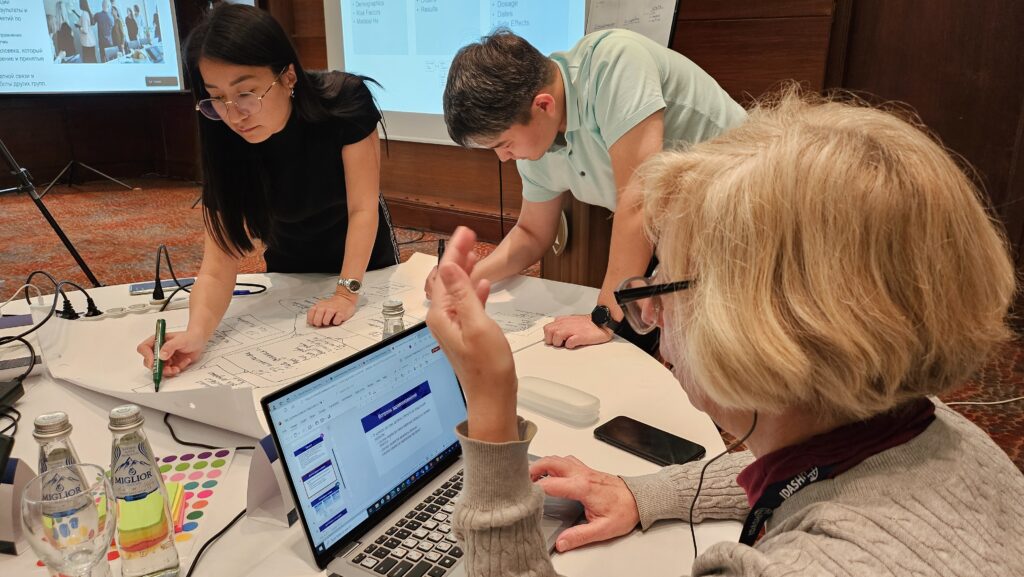
Last month, the International Training and Education Center for Health (I-TECH), in collaboration with the U.S. Centers for Disease Control (CDC) and with support from the World Health Organization (WHO), facilitated the second of three in-person workshops for the Informatics and Data Science for Health (IDASH) fellowship.
Held in Almaty, Kazakhstan, the workshop marked the mid-point of the 12-month fellowship—and a chance for participants to come together to advance their ability to apply public health informatics and data science concepts and approaches.
“This workshop included a lot of hands-on practical exercises, and it was fun to observe how engaged the participants were with these activities and with the learning in general,” said Stacey Lissit, MPH, MS, Senior Technical Advisor for the IDASH program.
Content included all things data (quality, cleaning, analysis, visualization, governance, security, privacy, and confidentiality); interoperability; project management; business process analysis; and systems architecture. Sessions were a mix of didactic lecture, small group activities to practice application of skills and concepts, peer feedback, and guided hands-on learning in R and PowerBI. Over the course of the two weeks, participants collaborated to develop a data dashboard, a database schema, and a data quality workplan.
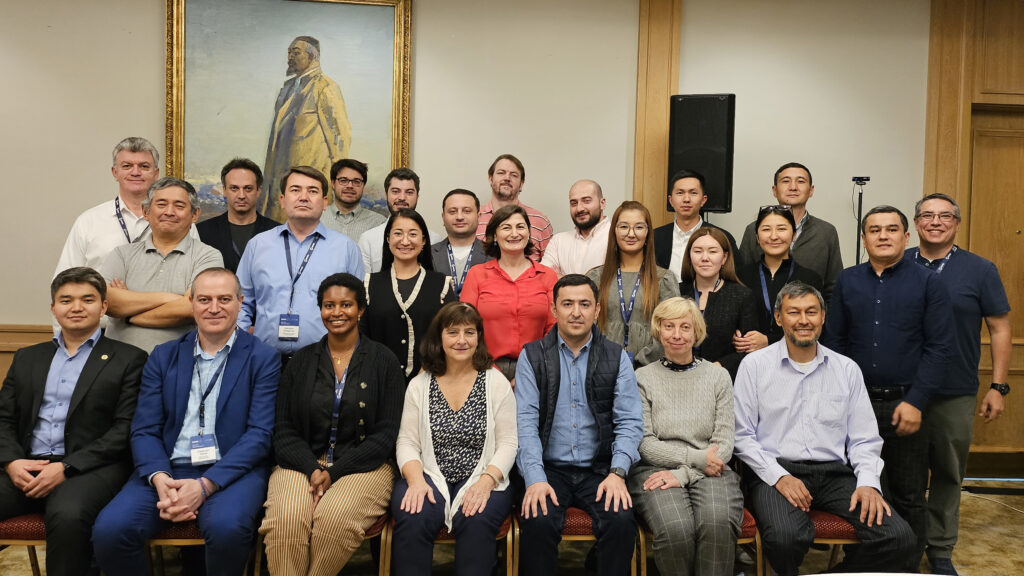
The current fellowship, launched in April 2023, comprises a cohort of four participants each from Georgia, Kazakhstan, Kyrgyzstan, Ukraine, and Uzbekistan—a total of 20 fellows. Each four-person team includes a mix of mid-senior level epidemiologists, informaticians, data scientists, IT, and public health policy personnel.
Fellow Zhanibek Yerubayev, Director of Public Health Emergency Operations at the Kazakhstan Ministry of Health’s National Center of Public Health, says the team mix is an integral part of IDASH’s impact. “[IDASH] connects people from the public health side with people from the IT side,” he says. “These people have a lot of projects to do [together], but they are not always well connected, and they do not always understand each other well.”
“It was exciting to see the relationships and community that are being built through the IDASH Fellowship – both within the country teams where fellows can collaborate closely with colleagues outside of their typical ‘work silos,’ and across countries within the region,” said Lissit. “That peer learning element is such an important part of the fellowship.”
And all efforts were made to ensure multi-directional collaboration. The Ukrainian team did not receive permission to travel to the workshop, so I-TECH made arrangements for them to participate via Zoom. A location was identified in southwest Ukraine where the team could attend the workshop together remotely, experience fewer daily safety issues related to the war, and avoid the distractions of being in their own workplace. A simultaneous translator for the Ukrainian language was provided on the Zoom call.
While remote participation is not ideal, the Ukraine team was able to attend and hear most of the workshop sessions and engage in the group work in meaningful ways. “A lot of effort went into setting up the technology that enabled this participation,” said Lissit. “At one point the Ukraine team was participating in a peer feedback activity with two country teams in Almaty—there were live cameramen, screen sharing, Zoom translators…and it worked mostly seamlessly!”
Fellow Durbek Aliyev, Deputy CEO at IT-Med LLC, which works under the Uzbekistan Ministry of Health, was especially appreciative of the chance to learn from a wide range experts across the region. “The digitalization of health care cannot be done by only one country itself,” said Aliyev. “The advantage of IDASH over other programs is that it brings [together] specialists from neighbor countries. We are talking to each other….We are learning from each other directly.”
And these relationships will be a lasting benefit of the program, he continued. “IDASH is a place where we can establish very good networking with other countries,” said Aliyev. “Any time I can contact them and learn from their expertise.”
IDASH is a project within the Integrated Next-Generation Surveillance in Global Health: Translation to Action (INSIGHT) program. In addition to acquiring new skills and knowledge in public health informatics and data science, IDASH country teams are developing and will implement a collaborative team project that demonstrates key competencies and is aligned with their country’s needs and priorities.
National HIV Psychosocial Services Expansion in Trinidad and Tobago
In 2019, I-TECH conducted an on-site assessment at Trinidad and Tobago’s largest HIV treatment site. The findings of that assessment led to the establishment of an integrated psychosocial program at this site that has yielded favorable results. This further inspired the need for expansion of this psychosocial approach to other HIV treatment and care sites.
In 2022, I-TECH collaborated with the HIV/AIDS Coordinating Unit (HACU) of the Ministry of Health (MOH) to conduct a similar rapid assessment throughout the national treatment and care sites. The results reflected that there was a need for specialized staff to identify and treat common mental health and psychosocial concerns, as well as a standardized approach. Therefore, I-TECH is supporting the HACU to lead the expansion and strengthening of mental health and psychosocial (MHPS) service delivery for persons living with HIV at HIV treatment and care sites in Trinidad and Tobago. Goals include the standardization of psychosocial assessments to support the early identification of psychological distress, symptoms of co-morbid mental illness and psychosocial issues; as well as the standardization of the procedures for making interventions.
Activities include:
- Developing a draft MHPS Protocol to include screening and intervention tools and psychosocial standard operating procedures (SOPs)
- Establishing a standardized referral system
- Training and supporting psychosocial team members in the use of the SOPs and all screening and assessment tools. Training will address areas of intimate partner violence, gender-based violence, and mental health challenges that are frequently encountered within the client population
- Training and supporting psychosocial team members in data collection and reporting requirements
- Training and capacity -building of psychosocial team members of the Psychosocial Coordination Unit being established by the HACU
eLearning Programs for Health Care Workers in Trinidad and Tobago
I-TECH partners with the HIV/AIDS Coordinating Unit (HACU) of the Ministry of Health (MOH), the National AIDS Coordinating Committee (NACC) of the Office of the Prime Minister, and other local organizations to make accessible learning and capacity-building opportunities for all cadres of health care workers.
- Learning Management System (LMS): I-TECH and the University of Washington Department of Global Health’s eLearning Program (eDGH) collaborated to adapt an LMS for Trinidad and Tobago from the Jamaica LMS. The LMS for Trinidad and Tobago will support ongoing, standardized capacity-building of an increased number of health care providers in a cost-effective way. The LMS will also function as a monitoring and evaluation tool for training and skill building. I-TECH will support, develop, and adapt HIV course material and provide local administration and coordination support.
- Key Populations Preceptorship Web Modules: I-TECH is currently developing self-paced, eLearning training modules to improve providers’ knowledge, skill, and comfort in providing respectful and gender-affirming care for gay and bisexual men, other men who have sex with men, people of transgender experience, and people engaging in sex work. This module will be an adaptation of the innovative in-person Key Population Preceptorship (KPP) Program for Clinicians and will be made accessible on the I-TECH/eDGH LMS that is being developed. The modules will incorporate video recordings featuring local community members, modeling of best practices, and show interactive exercises.
- UW eDGH Online Courses: I-TECH, through eDGH and in collaboration with HACU and the NACC Office of the Prime Minister, provides online certification courses to health care providers in Trinidad and Tobago. Courses include: Clinical Management of HIV; Leadership and Management in Health; Fundamentals in Global Health Research; Policy Development and Advocacy for Global Health; Project Management in Global Health; Monitoring and Evaluation in Global Health; Fundamentals of Implementation Science; Wellbeing for Healthcare Professionals; and Global Mental Health.
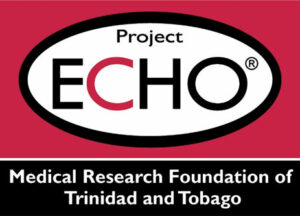 Medical Research Foundation of Trinidad and Tobago (MRFTT) HIV/STI Project ECHO® Series: In April 2019, I-TECH supported MRFTT, the HIV treatment site with the largest adult population in Trinidad and Tobago, to become an ECHO® hub site. The hub provides virtual clinical consultation support as well as brief didactic sessions for healthcare workers in Trinidad and Tobago on a range of medical/clinical and psychosocial topics, as well as those relevant to HIV care, treatment and support. Healthcare workers (HCWs) who have benefitted from the series not only include those from Trinidad and Tobago, but also HCWs from Haiti, Barbados, Bahamas, St. Vincent, Grenada, and Florida, USA.
Medical Research Foundation of Trinidad and Tobago (MRFTT) HIV/STI Project ECHO® Series: In April 2019, I-TECH supported MRFTT, the HIV treatment site with the largest adult population in Trinidad and Tobago, to become an ECHO® hub site. The hub provides virtual clinical consultation support as well as brief didactic sessions for healthcare workers in Trinidad and Tobago on a range of medical/clinical and psychosocial topics, as well as those relevant to HIV care, treatment and support. Healthcare workers (HCWs) who have benefitted from the series not only include those from Trinidad and Tobago, but also HCWs from Haiti, Barbados, Bahamas, St. Vincent, Grenada, and Florida, USA.- Management of HIV Infections Diploma Course: In 2014, I-TECH partnered with the University of the West Indies (UWI) – St. Augustine campus in Trinidad and Tobago to develop a blended eLearning course that enables HCWs to provide high-quality clinical management of patients living with HIV. This ten-month post-graduate diploma program is delivered through a series of online, self-paced courses taught by UWI faculty, and is augmented by synchronous virtual classroom discussions and hands-on, clinical practicum experiences. In recent years, I-TECH worked with the UWI to integrate extensive care and treatment content specifically focused on comprehensive care for key populations affected by HIV. The course is offered annually to healthcare workers from PEPFAR priority sites in the region. Course graduates include health care workers from Trinidad, Jamaica, Suriname, and Barbados.
Key Populations Preceptorship Program in Trinidad and Tobago
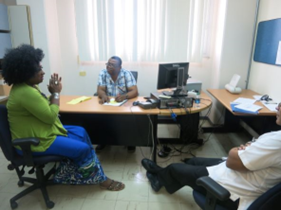 Reducing stigma and discrimination toward vulnerable groups in health care settings can have a positive impact on enrollment in care, retention in care and treatment, and viral suppression of HIV. The Key Populations Preceptorship (KPP) program is a simulated one-on-one patient-provider training program that brings together a health care provider and a preceptorship trainer (PT), who is a member of a key population group, with the observation of a training facilitator. The PT takes on the role of a mock patient and uses a pre-scripted scenario as a guide to interact with the provider-in-training, giving feedback after each scenario. The KPP builds the provider’s capacity to provide comprehensive and nonjudgmental care to key population groups including gay and bisexual men, other men who have sex with men, persons of trans experience, and sex workers.
Reducing stigma and discrimination toward vulnerable groups in health care settings can have a positive impact on enrollment in care, retention in care and treatment, and viral suppression of HIV. The Key Populations Preceptorship (KPP) program is a simulated one-on-one patient-provider training program that brings together a health care provider and a preceptorship trainer (PT), who is a member of a key population group, with the observation of a training facilitator. The PT takes on the role of a mock patient and uses a pre-scripted scenario as a guide to interact with the provider-in-training, giving feedback after each scenario. The KPP builds the provider’s capacity to provide comprehensive and nonjudgmental care to key population groups including gay and bisexual men, other men who have sex with men, persons of trans experience, and sex workers.
The KPP was adapted based on Jamaica’s KPP for clinicians in 2016 for physicians in Trinidad. In 2017, it was adapted for nurses and was delivered in-person over the course of a two-day period. In response to COVID-19 protocols, the KPP for social workers, which was adapted in 2020, was delivered virtually.
To be both cost efficient and effective, the KPP for Clinicians will be made into web modules and be accessible on a Learning Management System (LMS) that is being developed as a collaborative between I-TECH and the University of Washington Department of Global Health’s eLearning Program (eDGH).
In late October 2021, the KPP lost one of its most vibrant PTs when Trinidad and Tobago activist and community leader, Brandy Rodriquez, passed away.
PLHIV Support in Trinidad and Tobago
I-TECH Trinidad and Tobago collaborates with local organizations to implement programs focused on supporting the health and wellness of people living with HIV (PLHIV), including:
• National HIV Helpline: The COVID-19 pandemic highlighted the need for virtual support and information on HIV testing, care, treatment, and support, and an increased need for guidance and psychosocial support for PLHIV. This prompted the need for a central line for communication and connection to the HIV/AIDS network. For World AIDS Day 2021, the National AIDS Coordinating Committee (NACC), Office of the Prime Minister, in collaboration with the HIV AIDS Coordinating Unit (HACU) of the Ministry of Health and I-TECH, launched the national HIV helpline. I-TECH provides technical assistance, training, and capacity building support to the HIV Helpline Coordinator and Active Listeners and is supporting efforts to raise the social media profile to increase caller volume.

• Patient Health and Literacy: In collaboration with the National AIDS Coordinating Committee (NACC), Office of the Prime Minister and a technical working group comprised of PLHIV and non-governmental organization (NGO) representatives, I-TECH developed content across nine topic areas aimed at improving PLHIV health and treatment literacy. The content was integrated into the inaugural NACC website in a dedicated section titled “It’s All About U:” Identifying the Key Steps to a Healthier U, along your path to becoming Undetectable. Topic areas were focused on promoting and encouraging U=U with content titled: U and Your Dream Team; A healthy U; All about U and HIV; What U may get wrong; Your journey to U; U and your Partner; U in the future – HIV and Aging; U and your Baby – HIV and Pregnancy; HIV and COIVD-19 . The website is expected to facilitate wider access and reach to the PLHIV community and is the first content of its kind to provide consolidated, standardized and culturally appropriate material on HIV and AIDS treatment, care, and support in Trinidad and Tobago.